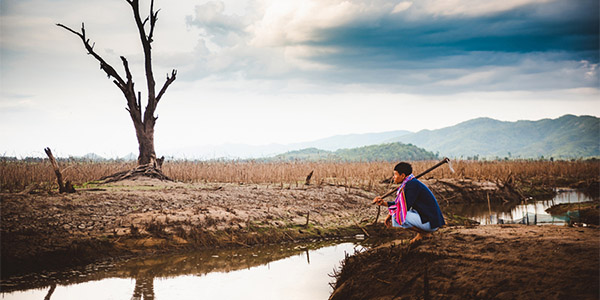SOLVING CLIMATE
MIT Climate Grand Challenges | SHASS engagement

CGC teams in the “Building equity and fairness into climate solutions” category will develop inclusive solutions that prioritize disadvantaged, minority, and indigenous populations.
The MIT Climate Grand Challenges
The initial call for ideas in 2020 yielded nearly 100 letters of interest from almost 400 faculty members and senior researchers, representing 90 percent of MIT departments. After an extensive evaluation, 27 finalist teams received a total of $2.7 million in funding to further develop plans and white papers. From those 27 proposals, 5 "flagship" teams were selected for further support.
MIT SHASS groups among the finalist and flagship projects include faculty from Comparative Media Studies, Economics/J-PAL, Philosophy, and Political Science.
The Five Flagship projects
The portfolio of multiyear projects focuses on delivering breakthrough solutions. Five flagship projects will drive the MIT Climate Grand Challenges research program, “a whole-of-MIT drive to develop game-changing advances to confront the escalating climate crisis, in time to make a difference,” says President Reif.
Story via MIT News
Flagship project with SHASS engagement
CREWSnet: Reinventing climate adaptation with the Climate Resilience Early Warning System
The CREWSNet team, which includes members of the SHASS-based J-PAL program, will develop forecasting technology to boost climate resilience by empowering underserved communities to interpret local risks, minimize loss, and plan for their futures. CREWSnet will initially be demonstrated in southwestern Bangladesh, serving as a model for similarly threatened regions around the world.
About | Story at MIT News
The 27 Finalist Projects
From nearly 100 letters of interest, 27 finalist teams were invited and funded to develop white papers.
Learn more about all the finalist projects
Finalist Projects with SHASS Engagement

Finalist
Reducing group-based disparities in climate adaptation
A CGC finalist team led by Evan Lieberman (Political Science) along with Danielle Wood (Aero/Astro) and Siqi Zheng (DUSP), aims to reduce ethnic and racial group-based disparities in the ability of urban communities to adapt to climate change.
About
______________________

Finalist
Equitable Resilience Framework
Sally Haslanger, Ford Professor of Philosophy, is a member of this team which is led by Janelle Knox-Hayes of Architecture and Planning. The team aims to make resilience more equitable, just, and effective, and to generate long-term economic, social, cultural, and environmental transformations. ERF facilitates just solutions while empowering communities that are often overburdened by environmental injustice and climate change impacts.
About
______________________

Finalist
The Deep Listening Project: Communication infrastructure for collaborative adaptation
Novel communications infrastructure from the MIT Civic Design Initiative aims to support communities on the frontlines of the climate crisis. The CMS/W project leads are James Paradis, Metcalf Professor of Writing and Comparative Media Studies; Eric Gordon, Visiting Professor in CMS/W; and Yihyun Lim, Director of the Design Lab. Additional team members include Kat Cizek, Caesar McDowell, Deb Roy, William Uricchio, and Sarah Wolozin.
About + Story: Conversations at the Frontline of Climate Change
______________________

Finalist
Policy innovation and experimentation for effective and equitable climate solutions
Climate change disproportionately affects people living in poverty and threatens to push over 120 million people below the global poverty line by 2030. To effectively and equitably confront climate change, leaders need scientific evidence for how to design policy innovations that overcome behavioral, economic, social, and political barriers to adoption. The project is led by Abhijit Banerjee, Iqbal Dhaliwal, and Claire Walsh of the Abdul Latif Jameel Poverty Action Lab in MIT SHASS. Additional team members are Clare Balboni, Sarah DiCioccio, Gabrielle Hauray, Namrata Kala, Benjamin Olken, Maike Pfeiffer, Adrien Rose, and Andrea Christina Ruiz.
About
______________________